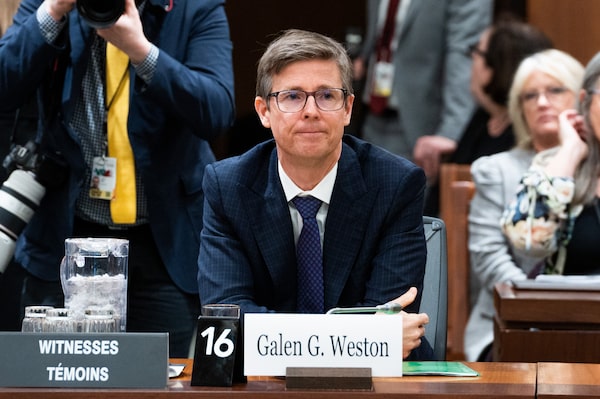
Galen G. Weston, Chairman and President of Loblaw Companies Limited waits to appear as witnesses at the Standing Committee on Agriculture and Agri-Food (AGRI) investigating food price inflation in Ottawa on March 8.Spencer Colby/The Canadian Press
Groups representing food suppliers and independent grocers are accusing Loblaw Cos. Ltd. L-T chairman Galen Weston of providing inaccurate information to members of Parliament this month, amid a continuing dispute over a code of conduct for the grocery industry.
Discussions have dragged on for more than two years, as industry groups have worked to develop a code that would govern relationships between grocery retailers and their suppliers. But in recent months, two of the largest grocers in the country – Loblaw and Walmart Canada – have said they will not sign the code in its current form.
On Dec. 7, Mr. Weston appeared at a House of Commons agriculture committee meeting in Ottawa, saying the code as it stands could contribute to higher food prices – a concern Loblaw also expressed in a letter to the committee in early November.
By way of example, Mr. Weston cited the experience of retailers in Australia, where a code is already in place, and where a third-party mechanism exists to resolve disputes. Mr. Weston told MPs that in disputes over manufacturers’ requests for increases in product costs in Australia, the mechanism supported those increases “essentially 100 per cent” of the time.
“That risk is very real, and on its own is a reason for pause,” Mr. Weston told the committee, which is examining food prices in Canada.
But other industry groups say the risk is not real, and that Mr. Weston’s statements are not accurate.
“There is no third-party mechanism involved in the cost price increase process,” Australian Food and Grocery Council deputy chief executive officer Samantha Blake wrote in an e-mail last week to the Dairy Processors Association of Canada, after its president and CEO, Mathieu Frigon, contacted the council to ask about the example Mr. Weston cited. Ms. Blake noted in the e-mail that she had watched a video of Mr. Weston’s appearance, “and am equally baffled by the comments.”
The independent reviewer for the Australian code, Chris Leptos, also wrote in an e-mailed response to Mr. Frigon’s inquiries that Mr. Weston’s comments were incorrect. The correspondence and the concerns from industry groups over Mr. Weston’s comments were first reported by La Presse on Saturday.
On Tuesday, seven industry groups, which are also on the steering committee developing the code, wrote to the MPs on the parliamentary committee to point out the discrepancy.
“Given that Australian sources, including the Independent Reviewer under the Australian Food and Grocery Code, have said that Mr. Weston’s statements to the Agriculture and Agri-foods Committee were inaccurate, we urge you and your fellow Committee members to disregard this part of his testimony when drafting your final report,” the letter stated. It was signed by leaders of the Canadian Federation of Agriculture; Canadian Federation of Independent Grocers; Conseil de la transformation alimentaire du Québec; DPAC; Food, Health & Consumer Products of Canada; Food Producers of Canada; and L’Union des producteurs agricoles.
In an e-mailed statement, Loblaw spokesperson Catherine Thomas repeated the concern that the code could restrict the ability of retailers to push back against cost increases from suppliers.
“We have spoken with senior grocery executives in Australia who have indicated that the dispute resolution process is flawed and currently under review,” Ms. Thomas wrote.
A number of large grocers, including Loblaw, have criticized multinational consumer-packaged-goods companies they say have pushed for more cost increases than necessary. Last week, Michael Medline, the CEO of Sobeys parent company Empire Co. Ltd. EMP-A-T, called the recent cost requests from some large suppliers “ridiculous” and “distressing.” Empire and competitor Metro Inc. have both been supportive of a code of conduct.
The industry effort to agree on a code is partly intended to avoid government intervention in regulating conduct between retailers and suppliers. In 2020, after tensions flared when Walmart WMT-N and Loblaw each announced unilateral hikes to supplier fees, Canada’s federal, provincial and territorial agriculture ministers formed a working group to study the issue. The group pushed the industry to develop its own code.
On the same day that Mr. Weston appeared in Ottawa in December, federal Agriculture Minister Lawrence MacAulay and Quebec Agriculture Minister André Lamontagne issued a joint statement urging industry members to sign on to the code. On Tuesday, Mr. MacAulay’s press secretary, Francis Chechile, wrote in an e-mailed statement that “an industry-led solution” would be the best outcome, but did not rule out the possibility that the government could intervene.
“We call for the major players to return to the table, adopt and adhere to the Code,” Mr. Chechile wrote. “The Government of Canada is continuing to explore all possible options, including legislation, should a voluntary Code not be achieved.”
While the code is not designed to regulate food prices, supporters say it could lower costs in the system, such as by curbing retailers’ ability to impose some fines on suppliers in the form of deductions from order payments. In a letter responding to Loblaw’s concerns on Nov. 2, the industry working group wrote that food prices, adjusted for inflation, declined between 2013 and 2023 in Australia, Ireland and the United Kingdom, where codes are in place; while prices rose in Canada and the United States, which are not governed by a code.
During his appearance in Ottawa, however, Mr. Weston pointed out that over the past two years, which have seen food prices spike globally, none of those three countries had lower food price inflation compared to Canada.
Food inflation remains above the general rate of inflation in Canada, but it is moderating. Statistics Canada reported on Tuesday that grocer prices rose 4.7 per cent in November compared to a year earlier, marking the first time since November, 2021, that grocery inflation was lower than 5 per cent.
 Susan Krashinsky Robertson
Susan Krashinsky Robertson